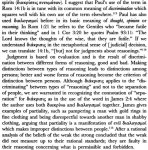And ask, why were the tablets God inscribed broken? And ask, why & how did the priests in the Law desecrate the sabbath without guilt? And ask, how did circumcision take precedence over sabbath if the 8th day fell on a 7th? And ask, how is it that God appointed another day, and why did He call it "today"?
Paul is speaking about those who are "Weak" in the Faith. Why would you ignore the very basis of this chapter?
What does it matter what the the weak in Faith believe. One man thinks this, another man thinks the another. So what.
Let each of us be convinced in our own mind who to listen to and who to follow.
"12 So then every one of us shall give account of himself to God."
Paul isn't telling folks to reject God's Instructions here if one feels like it. He is saying (paraphrase) you can't make someone Love God, or force a man to honor God with respect and obedience regarding this day or that. A man must be convinced in his own mind who is the Law Giver, and who is the son . It's called "Voluntary humility" in col. 2.
The question should be "after the Tables of stone were broken, what did God replace them with"?
Ex. 34:1 And the LORD said unto Moses, Hew thee two tables of stone like unto the first: and I (The Word which became Flesh) will write upon these tables the words that were in the first tables, which thou brakest.
The Priests we following the instructions given specifically to the Priesthood. Just like Jesus was following the instructions Specifically given to the Priesthood "after those days". They accused the Christ of braking God's Commandments for doing what the "Law" required, yet didn't condemn their own Priesthood for doing the same thing. He was once again, exposing their hypocrisy.
David said, in the Spirit, "Today" if you hear His voice harden not your hearts.



